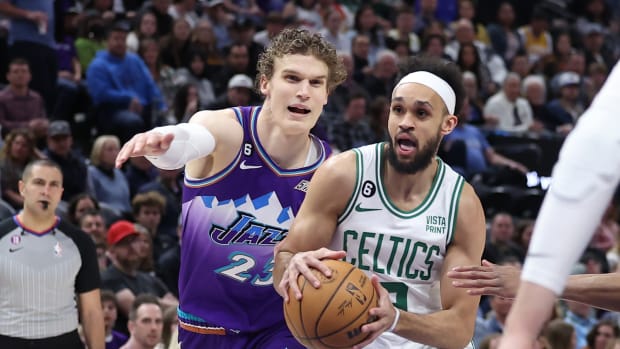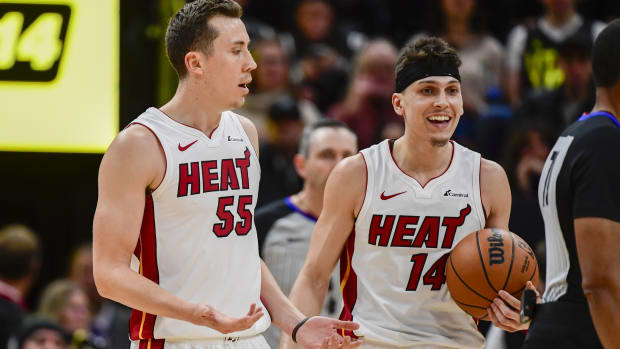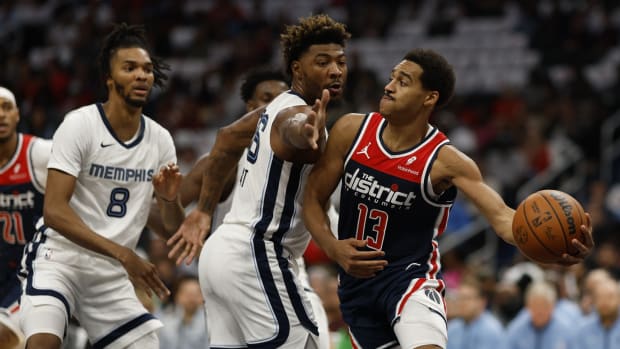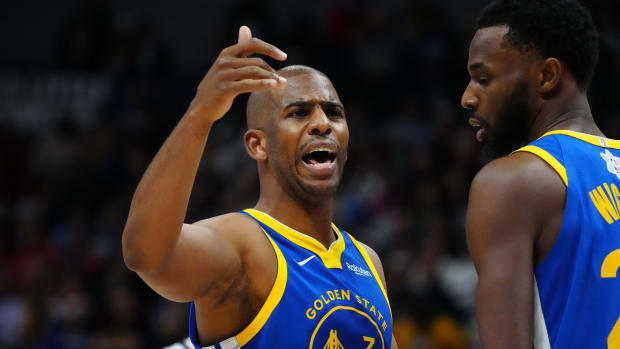Owners, players agree to disagree, leaving NBA season in jeopardy
NEW YORK -- The NBA players and owners met Tuesday, and shall we start with the main reason for encouragement? Here it is: The players have indicated a willingness to give back more money. No formal proposal was made and no one would define how much was in play, but it was a constructive idea all the same.
But before anyone starts looking forward to the champion Dallas Mavericks' Nov. 1 opener with the Bulls, the players also want it understood there are other issues involved. They were willing to relent on the money in return for maintaining the current salary-cap system -- a system the owners want no part of any longer.
So that was the end of that. They concluded more than five hours of negotiations Tuesday agreeing once again to disagree. As they prepared to regroup elsewhere Thursday with their constituencies -- owners will gather in Dallas, players will meet in Las Vegas -- both sides remained frustrated with one another while offering no reason for anyone to anticipate a full 82-game schedule. "We can't come out of here feeling as though training camps and the season are going to start on time"' said union president Derek Fisher.
"We did not have a great day," said commissioner David Stern, though he was not nearly as glum as the players. Perhaps Stern recognized important movement in the players' stance. Just last week the two sides had exchanged proposals, according to Stern, while engaging each other in conversations that were inspiring to both union and management. While union chief Billy Hunter said he hadn't been expecting to reach an agreement Tuesday, he was hoping to achieve progress to build on the gains of last week.
His side's idea was to give up some money in order to protect the system of guaranteed contracts that differentiates players in the NBA from those in the NFL. In presenting this idea, Hunter and Fisher were essentially trying to lever the talks into another phase that would enable the players to feel as though they had given up something of valuable but gained back something, too.
The players appeared to believe -- or hope -- that the split in revenues was far and away the most important issue for the owners. Currently the players receive 50 percent of all NBA revenues (or, to phrase it another way, the players receive 57 percent of a calculation called Basketball Related Income, or BRI, which doesn't account for all of the money generated by the NBA) and the owners have insisted they receive a smaller percentage over the course of an unprecedented 10-year agreement.
But now the players have to realize that management wants more from this deal than to make a simple profit. The owners of the smaller-market teams want to be liberated from the luxury-tax mechanism that enables the Lakers, Mavericks, Celtics and other highly ambitious franchises from outspending the competition. Fisher in particular has argued against the owners' belief that a hard ceiling on each team's salaries won't necessarily help the Minnesota Timberwolves compete with the Orlando Magic.
"Derek has made the point that other factors go into winning championships, and we agree," said deputy commissioner Adam Silver. "But (spending) is a critical issue. It's something we want to fix in this deal."
Stern's point of view is obvious: How can he hope to raise the values of all the franchises when many small-market teams lack the wherewithal to compete financially with the big boys? Fisher believes just as strongly in his own point of view -- that the owner who spends more to buy a franchise in a larger market deserves to reap the rewards. Why should someone who buys a house in the poor end of town be entitled to the same benefits as another homebuyer who invested in a gated community?
Both sides can argue all day about this. The bottom line is that the owners have the means to win this argument because they can afford to not pay the players longer than the players can afford to live without their pay. The players yesterday spoke about moving overseas to play in Europe, but Stern -- who understands that market better than anyone -- knows they'll be frustrated by the relatively small salaries and the uncomfortable lifestyle they'll find abroad.
Hunter spoke about a "division" among the owners from large and small markets. It may very well be true that Stern is dealing with his own version of the Tea Party, whose demands for a financial overhaul must be respected in these negotiations. When the union insisted on no changes in the current salary-cap system, Stern and his owners caucused in private for three hours while searching for some creative answer that could make everyone happy. "I don't remember how many owners we had, but we had as many views as to how that could be reached," said Stern with a smile. "So we were not unanimous in every aspect of it. But all of the owners were completely unified in the view that we needed a system that at the end of the day allowed 30 teams to compete.
"We went back and said to the players that although we've been talking to each other, agreeing, disagreeing, coming up with everything that we possibly could to see whether there was still time to save the season, it actually didn't make sense for us to respond to their nonnegotiable demand that everything remain the same as it was."
With each passing month it becomes harder to ignore the likelihood that the NBA is about to change in a major way. Not only are the owners intent on reclaiming a larger share of the proceeds, but they also want to create parity in a league that has spent the last three decades championing the same few franchises again and again. The players can and will argue that the owners' belief in a hard ceiling will do more harm than good. But can the players ever win their side of the argument?
And if the owners are destined to have their way, then the next question deals with the crucial matter of time. Can they convince or coerce the players to agree in time to save most of this season?


































